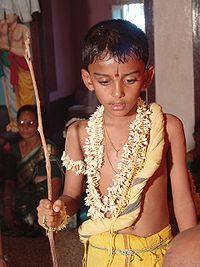
Karnavedha
Encyclopedia
Karnavedha or Karnavedham is one of the Hindu
Samskara
s (sacraments) performed for a child. It is an ear piercing ceremony that occurs in the third or fifth year for some Hindu children. This can still be performed in later years.
Brahmins perform Karnavedha, which is one of the sixteen major Samskaras (rites) during the course of their lifetime.
Brahmins follow these complex rituals in connection with major events in their lives, such as pregnancy, childbirth, education, marriage, and death. The major Samskaras 16 in number are generally known as "Shodasha Samskaras". These samskaras are mentioned in the Vedas, Karnavedha is noted to be performed by male Hindu's as well (see picture). It is stated in the Veda's that Brahmin's male and female, adhere to all Samskaras as they are considered the highest class of the 4 varnas, said to occupy the first position among the four varnas of Hinduism.
 Karnavedha not only applies to females but to males as well. Due to modern western influences Karnavedha has become an uncommon ritual overtime amongst males. Karnavedha should still be performed just as Upanayanam (thread ceremony - another major samskara ) or any other Samskara as each holds equivalent spiritual value.
Karnavedha not only applies to females but to males as well. Due to modern western influences Karnavedha has become an uncommon ritual overtime amongst males. Karnavedha should still be performed just as Upanayanam (thread ceremony - another major samskara ) or any other Samskara as each holds equivalent spiritual value.
Karnavedha is a Vedic rite of passage. Common between male and females, it is intended to open the inner ears of the child for receiving sacred sounds. This rite has deep mystical and symbolic significance. It is believed that merely hearing sacred sounds has merit in that it cleanses sin and nurtures the spirit.
As years passed, the "Karnavedha" became religious attire so its recital became obligatory and not doing it is regarded as sin in some places. According to a medieval writer, "All the accumulated merits disappear at the sight of a Brahmana through whose ear holes do not pass the rays of the sun. No gift should be given to him in the Sraddha ceremonies. If one gives, he becomes an `asura` or demon."
One should not think that due to modern lifestyle or appearance that karnavedha should not be performed for males. You cannot accept another Samskara and deny another due to this. Preventing a child or person from performing anyone of the 16 Samskara's even not knowing, can cause great spiritual disruption and negativity.
Hindu
Hindu refers to an identity associated with the philosophical, religious and cultural systems that are indigenous to the Indian subcontinent. As used in the Constitution of India, the word "Hindu" is also attributed to all persons professing any Indian religion...
Samskara
Samskara
Samskara may refer to:* Saṃskāra, Hindu rites* Saṃskāra , in Buddhism, mental and volitional formations* Samskara , a technique in ayurvedic medicine...
s (sacraments) performed for a child. It is an ear piercing ceremony that occurs in the third or fifth year for some Hindu children. This can still be performed in later years.
Brahmins perform Karnavedha, which is one of the sixteen major Samskaras (rites) during the course of their lifetime.
Brahmins follow these complex rituals in connection with major events in their lives, such as pregnancy, childbirth, education, marriage, and death. The major Samskaras 16 in number are generally known as "Shodasha Samskaras". These samskaras are mentioned in the Vedas, Karnavedha is noted to be performed by male Hindu's as well (see picture). It is stated in the Veda's that Brahmin's male and female, adhere to all Samskaras as they are considered the highest class of the 4 varnas, said to occupy the first position among the four varnas of Hinduism.

Karnavedha is a Vedic rite of passage. Common between male and females, it is intended to open the inner ears of the child for receiving sacred sounds. This rite has deep mystical and symbolic significance. It is believed that merely hearing sacred sounds has merit in that it cleanses sin and nurtures the spirit.
As years passed, the "Karnavedha" became religious attire so its recital became obligatory and not doing it is regarded as sin in some places. According to a medieval writer, "All the accumulated merits disappear at the sight of a Brahmana through whose ear holes do not pass the rays of the sun. No gift should be given to him in the Sraddha ceremonies. If one gives, he becomes an `asura` or demon."
One should not think that due to modern lifestyle or appearance that karnavedha should not be performed for males. You cannot accept another Samskara and deny another due to this. Preventing a child or person from performing anyone of the 16 Samskara's even not knowing, can cause great spiritual disruption and negativity.

